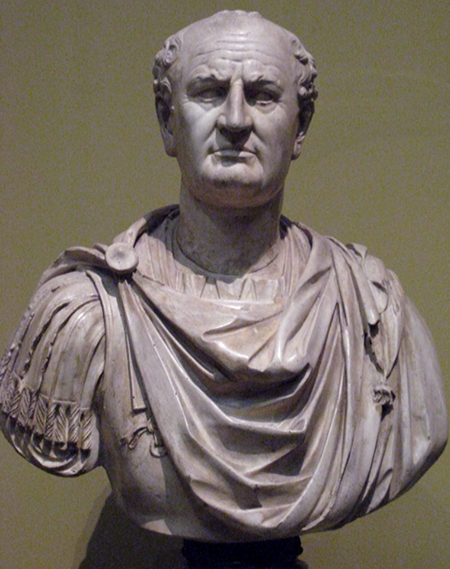The Roman army had played a significant role in the struggle for power after the death of Nero Claudius Caesar in 68 AD. The troops in various parts of the Roman Empire supported their candidates for the Emperor. That is why 69 AD was also known as the year of the four Emperors in which four emperors ruled in succession: Servius Sulpicius Galba, Marcus Salvius Otho, Aulus Vitellius, Vespasian. At the end the situation in Roman Empire was stabilized by Vespasian (69 – 79 AD) who managed to impose himself as a solo ruler. He became the founder of the Flavian dynasty, which was named by his middle name Flavius. He ruled wisely and like Octavian Augustus, in order to gain an illusion that someone else (Senate!) had great authority.
He gave the right of Roman citizenship to all non-Romans who served in the Roman army. Vespasian secured the remote parts of the Empire by inhabiting veterans and by building roads and fortifications. He was very careful about the financial burdening of the citizens, so he had worked on tax policy as well. He was known for his last words before his death: “Ah, blessed me! I feel that I’m turning into God.”



Neither Vespasian or his successors were from a noble or aristocratic Roman family. In many ways, this was Vespasian’s strength. He was a hard-headed and practical soldier and administrator who ridiculed most of the trappings of the office he held.
This dynasty did not last long, because her members were only two Vespasian’s son – Titus Flavius and Domitian.
Titus (79 – 81 AD) reign remained famous for completion of the construction the largest Roman amphitheatre – Coliseum, which his father Vespasian began construction of the around AD 70. During his reign the eruption of Vesuvius that destroyed the Roman cities Pompeii and Herculaneum.
Domitian (81 – 96 AD) was hated by the Roman aristocracy. His military and foreign policy was not uniformly successful. Domitian was the first emperor since Claudius (43) to campaign in person. Both in Britain and in Germany advances were made by the Romans early in the reign, and the construction of the Rhine-Danube limes (“fortified line”) owes more to Domitian than to any other emperor. Domitian liked games, in particular, chariot races. As his reign progressed and the pressures of ruling mounted, his paranoia seized him. In order to pay for his extravagances he tightened the Jewish tax enacted by his father and seized the fortunes of senators and wealthy Romans. A group of senators organized his murder, and with this act ended Flavian dynasty.
